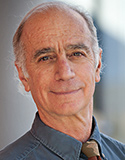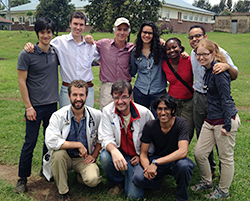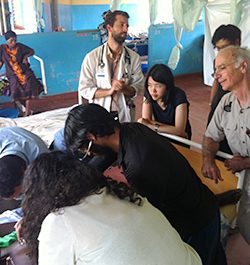

Global Health Pioneer
Jerry Paccione: Reflections of a Leader in Global Health
Tropical medicine. International health. Global health. There are many names for a branch of medicine that transcends national borders. There's also a name that's virtually synonymous with the field: Dr. Jerry Paccione.

Gerald Paccione, Jr., M.D.An internist and professor of clinical medicine, Dr. Paccione—who received the Honorary Alumnus Award at Einstein's 2014 commencement ceremony—began serving abroad nearly 40 years ago. As a student at Harvard Medical School in 1975, he volunteered to provide primary care and help organize a nutrition program in a remote region of Guatemala. Working for a year out of a one-room adobe hut, he treated residents of three villages who otherwise might never have received basic health services.
That experience shaped his future career. After joining the Einstein faculty in 1982, Dr. Paccione created student and resident training opportunities abroad, initially in South America and eventually around the world. He also founded the primary care residency program, later directing the merged program of primary care/social internal medicine at Montefiore Medical Center, the University Hospital for Einstein. He helped launch special clinics for immigrants in the South Bronx as well, and for victims of international human rights abuse. And, he helped establish the medical school's Global Health Center. His work has taken him to Latin America, Vietnam, and Africa.

Dr. Paccione with Einstein global health fellows in Kisoro, Uganda (Clockwise from left): Nori Murakami, Brad Petersen, Jerry Paccione, Christina Cruz, Stella Safo, Rafael Frias, Elena Bryce, Amit Patel, Kenneth Schaefle and Chris Beaudoin."From my start in medicine, I'd always been interested in working in other parts of the world," he said recently. "I like the balance between serving in the U.S. and abroad. It makes you appreciate what we have here, and sometimes, unfortunately, take for granted."
Training Students, Residents & Faculty
For the past 15 years, Dr. Paccione's work has focused on the east African nation of Uganda. Since 2006, he has led the collaboration among Einstein, Montefiore, and international advocacy group Doctors for Global Health to help staff a public hospital in the impoverished, rural Ugandan district of Kisoro. The hospital, one of only two serving a population of 270,000, is underfunded and overworked. Its two physicians are responsible for more than 150 beds, and its nurse staffing level is only 60 percent of capacity.
The fellowship program that Dr. Paccione leads brings faculty members, students and residents to work on the hospital wards and to team with village health workers on public health projects in dozens of surrounding communities. Over the past eight years, the program has served tens of thousands of patients, while providing real-world training for more than 200 students and residents.
The Changing Field of Global Health
The popularity of the program seems to reflect the growing interest and changes in global health. "The world has gotten a lot closer," said Dr. Paccione. "We're no longer just looking at tropical diseases like malaria but a burgeoning epidemic of chronic diseases that we're used to treating here, and they have no one to diagnose or treat them in rural Africa.

Dr. Paccione during rounds at the hospital in KisoroHe continued, "We're also looking at disparities in health that are due to abject poverty—HIV, TB, malnutrition. Health is not just about medicine; it's primarily about social issues, and thus our program in Kisoro extends into the rural countryside through microfinance initiatives, malnutrition projects, and community health workers with whom our students collaborate."
In addition, technological advances and other changes have "shrunk" the world, increasing awareness of global health problems and making it easier for scientists and clinicians to combat them. "It used to be that people who did this work were separated and distant. Now going off to work in global health doesn't have to be like going into exile. It can be like taking the subway. The field has really opened up."
Making Use of Resources at Hand
Treating patients in places like Kisoro poses unique challenges, he continued. While patients typically come in for treatment later in the course of their illness, clinicians have fewer tools and tests at their disposal than they would in the U.S. But professional rewards also are special.
"It's a joy to practice medicine with your hands and with your eyes," Dr. Paccione said. "You learn the importance of the physical exam, of relying on your own judgment. You're really practicing medicine on the frontier, and this gives you a different perspective on disease."
Ultimately, the knowledge and experience gained overseas benefits patients closer to home, according to Dr. Paccione. "The issues we deal with in Kisoro are some of the same issues we deal with in communities throughout our own nation. So, by investing in global health, we're also investing in our own communities. That means a lot to me as a doctor. And I've been very fortunate to find a place that allows me to act on that value."
Posted on: Thursday, May 29, 2014

Tablet Blog